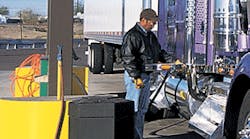On Friday, Minnesota, the only state to mandate that all retail diesel be 2% biodiesel, has suspended its rule for 10 days on concerns that the fuel doesn’t meet quality standards. The suspension came just one month after the biodiesel rule became effective, raising concerns about the stability of the state’s diesel supply.
On Friday, the Minnesota Trucking Assn. (MTA) said several of the state’s diesel terminals shut down because they could not meet the biodiesel rule. Trucking companies had difficulty locating loads of diesel, the lobbying group added.
“When they do find them, they are paying upwards of $3.23 a gallon,” stated MTA in a letter to Governor Tim Pawlenty. “The industry cannot afford additional supply disruptions and associated cost increases, especially those caused by application of Minnesota’s biodiesel law.” MTA criticized the state for lacking a contingency plan in the case of a biodiesel supply disruption.
Today diesel prices in Minnesota average $3.222, compared with a national average of $3.051, according to the Oil Price Information Service (OPIS). OPIS markets editor Denton Cinquegrana was unable to confirm any price fluctuation as a result of the biodiesel quality issue that surfaced Thursday.
“Diesel prices had peaked in Minnesota at $3.39 on Oct. 24 (days before the report),” Cinquegrana told FleetOwner, pointing out that prices had since dropped nearly 17 cents. Diesel price trends in Minnesota have followed the national trend of falling recently, Cinquegrana added. Although OPIS data doesn’t reflect this, he acknowledged that local supply disruptions typically send prices climbing.
The problem surfaced when Flint Hills Resources refinery— the state’s largest refinery— reported that a shipment of biodiesel did not meet quality specifications. The refiner petitioned the Governor for a waiver to avoid legal issues.
Specifically, the refiner reported that the fuel had a lower flash point—the temperature at which a fuel combusts— than the legal specification of 130º C. The flash point of biodiesel indirectly affects the mechanical operation of diesel engines in that a 100º C flashpoint ensures that potentially damaging methanol is sufficiently removed.
Steve Howell, technical director of the National Biodiesel Board (NBB) said that biodiesel with a flash point of 100º C or higher is technically “good” fuel, and the legal 130º standard provides a buffer to help ensure the fuel’s quality. Howell added that NBB is closely monitoring the validity of the report from Flint Hills refinery.
“If [the flashpoint of the fuel] is below 100º and it has a methanol content above 0.2%, there is the potential for safety and handling issues as well as long-term negative effects on engines,” said Howell.
According to Howell, over the weekend biodiesel tests at other facilities produced encouraging results that suggest the flash point issue may be put to rest soon.
“We may even find out that the product that was reported to be out of spec, wasn’t in fact out of spec,” Howell said. “We expect that if there are any problems, it will be resolved next week.”




